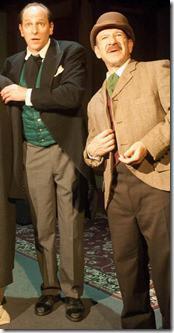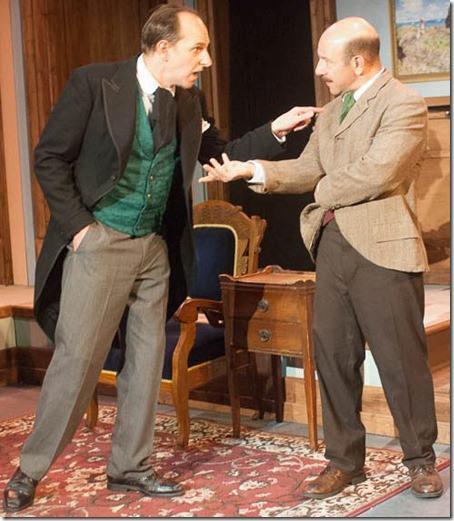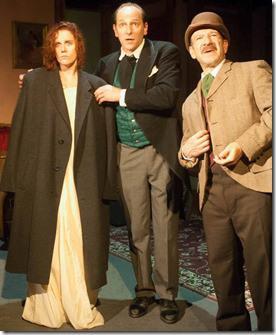
The Seven-Per-Cent Solution
Written by Nicholas Meyer
Adapted by Terry McCabe
City Lit Theater, 1020 W. Bryn Mawr (map)
thru Nov 15 | tix: $29 | more info
Check for half-price tickets
One-hundred-per-cent enjoyment!

City Lit Theater presents
The Seven-Per-Cent Solution
Review by Lawrence Bommer
Putting us forever in his debt, Sir Arthur Conan Doyle perfected his Baker Street wonder Sherlock Holmes and Dr. John Watson in four novels and 56 short stories. Of course, long ago the super sleuth and his stolid sidekick escaped their origins–they’re legends apart from an author. A brilliant recreator of the deft detective, screenwriter Nicholas Meyer has written two Holmes novels that crackle with the intellectual urgency of his seminal source. (In his screenplay for “The Undiscovered Country,” Meyers even maintains that Mr. Spock’s human side comes from his descent from Sherlock Holmes.)

The rollicking tale is narrated by Adam Bitterman. He merrily delivers a gruff and game 87-year-old Watson looking back on his career with Holmes (a richly nuanced James Sparling) from a nursing home in 1939. (Holmes, it seems, died ten years before.) Dictating his memoirs to an amanuensis (Chelsea Roberts), he recalls the details of Holmes’ last case–and it’s not the fatal encounter with mathematics professor Moriarty (Elliott Fredland), that fiendish mastermind who takes Holmes to a watery death in a duel over Reichenbach Falls.
No, this psychological case history is much more human: Watson relates, then depicts, how he sought to cure his friend of his lifelong addiction to cocaine, a relief, so it seemed, for Holmes’ feverish mind from the boredom of idleness. Using Sherlock’s single-minded pursuit of Moriarty as a goad (and even involving the “Napoleon of crime” in the subterfuge), Watson will lure Holmes to Vienna. There a certain Austrian “specialist” (Lee Wichman) will hypnotize him and preside over his withdrawal from the dangerous white powder.
City Lit has requested that critics refrain from revealing the name of this Austrian specialist, or “alienist” as such counselors were called in 1890. It’s a specious suggestion to shield ignorance more than to protect an obvious surprise, particularly since this A.S. plays a major part in what follows. Indeed, A.S. provides the work’s most cogent contribution to the Holmes lore–namely that the observant deduction practiced by Holmes on outward objects and events is the exact same strategy that psychoanalysis employs for retroactively explaining the inward mazes of the mind.
Well, never mind: Eager to avoid a spoiler alert, I’ll protect the absurd anonymity of a famous figure whose name is “Joy” in German. Suffice it to say that, once cured (and it’s a combination of “The Lost Weekend” and an “intervention” on the A&E cable network), Holmes and the A.S. get to work together in a medical mystery. Each practices his splendidly different method at solving a complex crisis and an audience can only delight in the results.
It seems that, almost beginning before World War I fourteen years early, a nefarious munitions magnate and baron (Goran Norquist) threatens the balance of power. Perhaps worse, in pursuit of an early inheritance, the blackguard menaces and abuses his deceased father’s suicidal widow (Adrienne Matzen). According to A.S., this nasty Baron Von Leinsdorf is entangled in ambivalent feelings about his mother and his desire to replace his father. It’s a filial-parental conflict of attraction and guilt that’s by no means restricted to war profiteers and abductors of stepmothers. Leinsdorf’s wicked plot leads to a thrilling showdown–a train chase through the Bavarian countryside and a duel to the death with swords and epithets. The only drawback here is the overly expository epilogue, but even this adds to rather than subtracts from the mystique of Sherlock Holmes.
It’s delightful to watch Holmes and A.S. in action, Sparlings’ splenetic and driven process of elimination a rich contrast to the introspective experimentation of Wichman’s “talking cure.” But then everything clicks—from Ray Toler’s period set to LaVisa Angela Williams’ historical costumes to Laura J. Wiley’s romantic lighting effects. Best of all, playing 18 roles, the crackerjack eight-member ensemble keep the game afoot, with food for thought and thrills galore, plentifully provided. But no “nose candy” whatever.
Rating: ★★★★
The Seven-Per-Cent Solution continues through November 15th at City Lit Theater, 1020 W. Bryn Mawr (map), with performances Fridays and Saturdays at 7pm; Sundays 3pm (Thurs. Nov. 5 and 12, 7:30pm). Tickets are $29 (seniors: $25, students/military: $10), and are available by phone (800-838-3006) or online through BrownPaperTickets.com (check for half-price tickets at Goldstar.com). More information at CityLit.org. (Running time: 2 hours 15 minutes, includes an intermission)
Photos by Paul Grigonis
artists
cast
Chelsea Roberts (Miss Dobson, The Supposed Baroness), Adam Bitterman (Dr. John H. Watson), James Sparling (Mr. Sherlock Holmes), Elliott Fredland (Prof. James Moriarty, First Austrian Cabdriver, Dr. Schultz, Railroad Stationmaster), Lee Wichman (Stamford, Austrian Specialist), Adrienne Matzen (Mary Watson, Nancy), Robert Kaercher (Mr. Mycroft Holmes, Hugo von Hofmannsthal, Police Sergeant), Goran Norquist (Sherman the Naturalist, Second Austrian Cabdriver, Baron von Leinsdorf)
behind the scenes
Warner Crocker (director), Laura J. Wiley (lighting design), Ray Toler (set design), LaVisa Angela Williams (costume design), Tyler McCabe (sound design), Patrick J. Murphy III (stage manager), Paul Grigonis (photos)
15-1024

